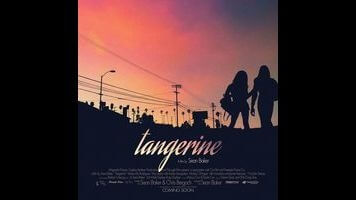Tangerine is the frenetic transgender iPhone Christmas movie of the year

Gunning for Buzzard’s spot as the most credibly underground American indie of the year, in comes Tangerine, Sean Baker’s motor-mouthed, occasionally hyper-active, at times repetitious tour of the street corners, fleabag motels, and back alleys of West Hollywood. Let out of jail on the morning before Christmas, transgender prostitute Sin-Dee Rella (Kitana Kiki Rodriguez) learns that her boyfriend-slash-pimp Chester (James Ransone, pretty funny) has been cheating on her with a fish—what you’d call a cisgender woman in academic company—named Dana or Desiree or Dinah. Nobody seems 100 percent sure on the name, except that it starts with a D. So off go Sin-Dee and her best friend Alexandra (Mya Taylor), hitting up every corner and soup line, occasionally crossing paths with an Armenian cabbie (Karren Karagulian) and the odd cop or stingy client. Shot on an iPhone outfitted with an anamorphic clip-on adapter, the movie bobs, weaves, and glides down sidewalks, while the soundtrack blasts out semi-obnoxious dance beats in between snatches of Beethoven and Armenian-language holiday song.
The script, by Baker and Chris Bergoch, is essentially an old-fashioned stage farce—complete with a harridan mother-in-law and a big ending commotion—spread out over several miles of city and transposed into a social stratum that’s somewhere below the bottom. Johns are serviced in automatic car washes, wigs are ruined, and plenty of meth gets smoked in bathrooms, motel rooms, and out on the street. Baker (Starlet, Greg The Bunny) traffics in the big and broad, but his aesthetic here is totally ratty; at times, the movie’s imagery, frenetic movement, and distorted wide-angle close-ups bring to mind Crank: High Voltage and Inland Empire crossed with a low-budget music video. Of course, the shot-on-an-iPhone aspect—which ends up looking much better than it probably should—creates a tenuous sense of reality, in which the viewer is never completely sure who is an actor and who is merely a bystander. It helps that Rodriguez and Taylor are total hams. Over-exaggerated and rapid-fire, their performances don’t register as acting in the conventional sense; instead, it just feels as though the camera—or camera phone, in this case—were following them around.
And yet, Tangerine is unabashedly a Christmas story, and one that ends with a simple, poignant gesture of empathy and generosity. Between the two of them, Alexandra and Sin-Dee seem to set to a Goodfellas-like record for instances of “bitch” as an affectionate term, beginning with the opening line: “Merry Christmas, bitch.” For all of Tangerine’s movement—with the characters continually circling a small territory, often coming back to the late-night hangout Donut Time—and all of its slapping and arguing, it’s the movie’s quietest, softest moments that register most strongly, be it Alexandra’s low-key performance of Victor Herbert’s “Toyland” to an almost empty bar, or the final scene, which finds her and Sin-Dee alone in a Laundromat at the end of a long, bad night. Perhaps these moments feel so graceful because they are oases; they matter because of the harsh, unforgiving terrain that has to be crossed in order to reach them. This terrain is drawn garishly, vividly, and with a sense of fun.